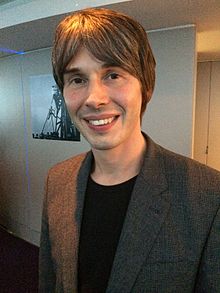 |
| Professor Brian Cox image wikimedia |
Wonders of the Universe is a 2011 television series produced by the BBC, Discovery Channel, and Science Channel, hosted by physicist Professor Brian Cox. Wonders of the Universe was first broadcast in the United Kingdom on BBC Two from 6 March 2011. The series comprises four episodes, each of which focuses on an aspect of the universe and features a 'wonder' relevant to the theme. It follows on from Cox's 2010 series for the BBC, Wonders of the Solar System.
wikipedia
In one of the episodes of this wonderful documentary professor Cox tells how as a young man he was inspired by Carl Sagan's masterpiece Cosmos - Personal Voyage (1980) and how it affected his choice of profession. And indeed, Wonders of the Universe and the earlier Wonders of the Solar System are in a way scientific updates of Sagan's work introducing materials discovered since 1980. The globe jumping voyage from Arizona crater to Burkes shales and elsewhere is made possible by the legendary camera and editing skills of BBC, Discovery Channel and Science Channel combined and the result is truly spectacular!
The documentary is a summary aimed at general public of what is known in cosmic scale about the Universe and touches critical stages in the evolution of life on Earth. Constantly pleasantly smiling Cox obviously enjoys talking about these things and his clarity of thinking is admirable.
The narrative is strictly scientific and includes actually very little of Sagan's personal voyage style views on Philosophy and Theology. It is descriptive rather than interpretative and the amount of information provided in such an elegant manner is staggering.
Worldview
Wonders of the Universe raises an important point concerning modern world view, Weltanschauung.
A comprehensive world view (or worldview) is the fundamental cognitive orientation of an individual or society encompassing the entirety of the individual or society's knowledge and point of view. A world view can include natural philosophy; fundamental, existential, and normative postulates; or themes, values, emotions, and ethics.
The term is a calque of the German word Weltanschauung, composed of Welt ('world') and Anschauung ('view' or 'outlook') It is a concept fundamental to German philosophy and epistemology and refers to a wide world perception. Additionally, it refers to the framework of ideas and beliefs forming a global description through which an individual, group or culture watches and interprets the world and interacts with it.
wikipedia
It has been said that for many Science has replaced Religion and that people like Carl Sagan, Stephen Hawking and Brian Cox are the priests of modern age explaining to us the nature and meaning of reality on the basis of proven facts rather than metaphysical concepts and belief systems. In short, they represent scientific worldview that can be discussed factually as well by an Atheist as a person adhering to any religion.
But here is the catch: the spectacular documentary shows God's wonderful works of creation without mentioning Him. This leaves the story incomplete and one gets the feeling of professor Cox glossing over the crucial questions of understanding what he is talking about.
Take, for example, the wonderful Cambrian fossil fields in Burkes Shale on the mountains near Vancouver Canada. Evolutionary Big Bang, as Cox explains, perhaps caused by evolving life starting to see light. The complex eye of trilobites is something that biologists and paleontologists can study with all their tools and yet nobody really has the answer as to why anything evolves.
Scientific worldview alone is not satisfactory to the deepest yearnings of humans to understand the world they live in. This marvelous document is an outstanding proof of that and shows that man is more than some people like to think.
No comments:
Post a Comment